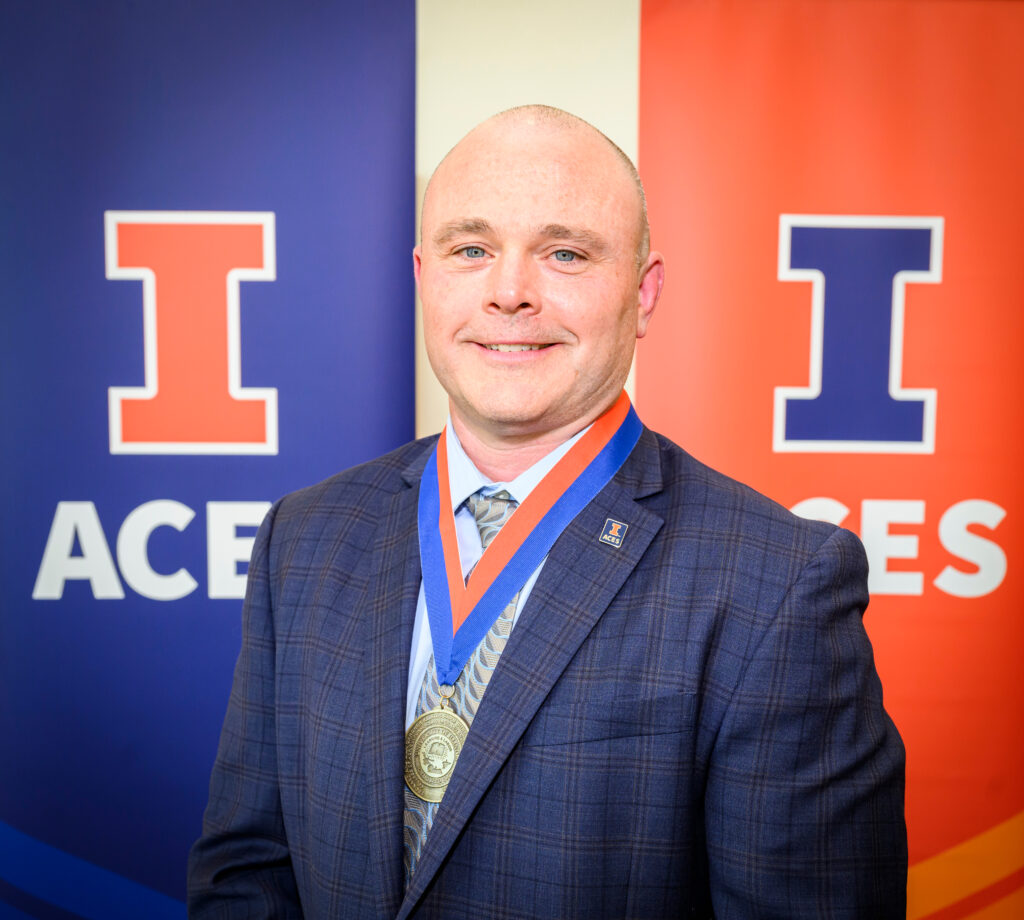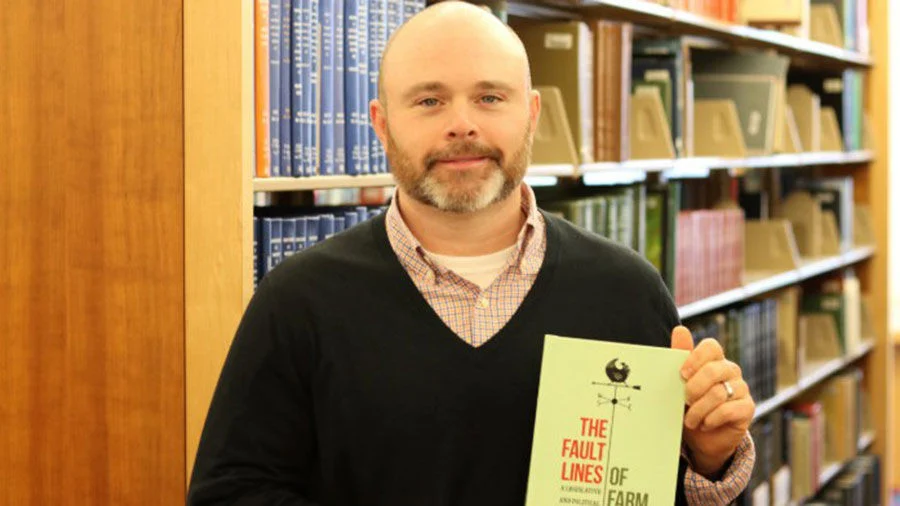
Jonathan Coppess plays a valuable role in ASC by informing research findings to policymakers and other governmental officials.
The Director of the Gardner Agriculture Policy Program and Associate Professor of Law and Policy for the University of Illinois’ Department of Agricultural and Consumer Economics, grew up on a farm in Ohio. After earning a Juris Doctorate degree from The George Washington University School of Law and practicing law in Chicago, he found his way back to agriculture through the policy space, where today he helps provide a valuable link from research to policy.
Coppess helps provide ASC scientists bridge the gap between research and policy, often interpreting their research to inform policymakers.
“I think ASC scientists, such as Kaiyu’s interest in policy, is phenomenal,” Coppess said. “It’s great to work with a researcher who has the perspective that research can be important for not just the academic value of it, but can also move policy, which can open up new research questions.”
Coppess sees his role as more of an interpreter rather than as an advocate or lobbyist. Although he doesn’t do the basic research, he helps apply research to policy questions, informing policymakers and their staff, farmers, and interest and stakeholder groups. That kind of work has invigorated him.
“For someone that doesn’t have the ability to do the research — but is curious about it and has a fascinated interest in it — I get a chance to find ways to incorporate that research into the work I do in the policy arena,” he said. “The application of research and policy is a challenge at times. Policy moves on a different time frame, but there’s always a need. Trying to figure out how to meet that need is actually fun.”
Coppess brings an impressive resume to his work with ASC. He served as Chief Council for the U.S. Senate Committee on Agriculture, Nutrition, and Forestry and played a lead role in the development of the 2014 Farm Bill. More recently, he served as Special Counsel for the U.S. Senate Committee on Agriculture, Nutrition, and Forestry where he assisted in the development of the Build Back Better Act, legislation that lays the groundwork for climate-smart agriculture and conservation policies. He also volunteered for the U.S. Department of Agriculture’s (UDSA) Agency Review Team as part of the Biden-Harris Transition Team in 2020-21.
On a full-time basis, he engages with farmers and policymakers on agriculture policy both in person and through the farmdoc daily and Policy Matters platforms — all while providing award-winning instruction to University of Illinois students, introducing them to public policy and the principles of policymaking.
Coppess’s road to UIUC, began in 2005, when he decided to pivot from his law practice.
“I’ve always liked politics, government and history and was really interested in some of the work my friends were doing on the Hill in the Senate,” Coppess recalls. “So I decided to try for that and eventually landed a job in the U.S. Senate.”
Coppess spent eight years in Washington, six of them in two stops with the Senate, and two years with the USDA. His experience in legislation and policy making gave him an intimate look at how bills were crafted and negotiated, which ultimately led to his current opportunity at the University of Illinois in 2013.
“They were looking for someone who wanted to focus on agricultural policy,” Coppess recalls. “To say it was a unique opportunity, understates it. It was an amazing chance. I always kind of joke that particularly when you are working in Congress, you’re running 100 miles an hour and everything is about an inch deep. Every day I felt like I was keeping a mental list of questions. One of the things that this position has allowed me to do is to take some deeper dives into policy issues and its development through history.”
His interest in both agriculture and history converged with the publication of his book, The Fault Lines of Farm Policy: A Legislative and Political History of the Farm Bill in 2018.
“The book is the product of all of those questions I had while working on the Hill,” Coppess said. “I just got lost in the history and trying to sort out which thing led to which issue. The regional issues were very clear, but I was struck by how long standing they were and was interested in how it plays out.

“When I was on the committee writing the bill that ultimately became the 2014 Farm Bill, I remember running around counting votes and using different spreadsheets to figure which votes we might gain and lose with a particular amendment. To see how historically these coalitions really accomplished the vote counting and how that, time and again, is a critical factor in how the policy developed, is really interesting.”
Coppess points out that although there is a long history of bipartisanship within the agricultural farm policy arena, much of the divide actually occurs over regional lines.
“The ugly reality of our politics today is that nothing escapes partisanship for long or completely,” he said. “However, there is a lot of crossover appeal where you are helping farmers and low-income families and looking at environmental issues and air and water quality.”
In terms of his work with ASC, he says that modeling, in particular, lends itself to some of these policy questions — especially when it comes to climate change.
“There are some fascinating things that Kaiyu’s research could inform,” Coppess said. “You can present outcomes and scenarios and use this research to open or expand the conversation away from one thing or another to a variety of options.”
After that, Coppess says the goal is to not only let people have a chance to make up their own mind, but also test their ideas. That feedback leads to more discussion and a wider range of ideas, which can be beneficial to the researcher, the policymaker, and the farmer.
“It feeds on itself,” he said. “One conversation leads to another set of questions that could lead to the next six conversations.”
Besides climate change, another hot issue (which is semi-related) is risk assessment, particularly when a farmer decides to change course from his normal practice. All of it gets to the bottom line (dollars and cents).
“The risk issues are huge,” Coppess said. “Change in those practices come with management risks as well as yield variance.”
He notes that policymakers don’t want to be the one to advocate for a policy that has major negative implications for the farmer. The farmer, in turn, is wary of making more bold changes than his neighbor that might risk not being able to pay the mortgage note.
ASC’s modeling and computational capabilities will be particularly helpful to run scenarios on those potential changes and to illustrate some of the challenges, for instance, around climate change and cover cropping. This can help farmers and policymakers shape future decisions.
“Analyzing risk and managing risk is a huge part of what a farmer does year in and year out,” Coppess notes. “Therefore, making sure practices are modified from an informed perspective is really critical. What’s unique to this industry is that if you make a mistake in the farm field, the whole year is gone. We will be able to run scenarios for the farmer and not have to wait five years to see the outcomes because they will have so much research to back it up.”
In addition to informing decisions, those meetings also help support the value of the research in the first place.
“We are helping policymakers understand that when they invest in research, over time we find different ways to use it,” he said. “It’s a good example of how that system plays out. It has value to them. It obviously has value to the university because it helps keep research funding going. It can improve policymakers’ understanding of what research funding can do.”
Coppess is excited to see what impact ASC can play in shaping agriculture going forward and feels fortunate to play a role.
“The opportunity to work directly with researchers and explore how their research findings can inform policy and how we can creatively shape those policies is rewarding,” he said. “It’s been a really amazing journey from working on policy to getting into the weeds of how research can be applied to it.”
